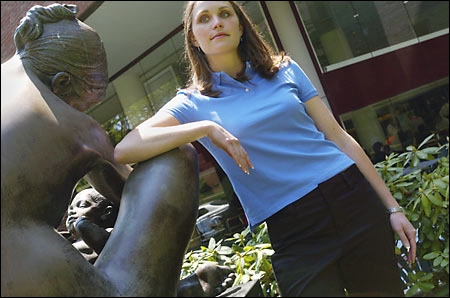Probing the role of gene reshuffling
Candy-striper, black belt, geneticist Winckler does a little role-reshuffling herself

While still a graduate student, Wendy Winckler took part in a major discovery about the nature of the human genome. She worked in the laboratory of David Altshuler, an associate professor of genetics at the Medical School, on recombination, the process by which a father and mother’s DNA gets reshuffled to create new variations of genes in their children. Although this is one of life’s most basic processes, surprisingly little is known about how it happens and how it can be used to study the risk of genetic diseases.
Scientists had assumed that recombination occurs randomly in any place along the human genome, which contains some 32,000 genes. But recently, they found that these changes take place mainly in specific areas, known as “hotspots.” About 99 percent of human DNA, the stuff of which genes are made, is identical to that of chimpanzees, Winckler explains, “So we set out to study recombination by comparing its patterns in the two species. We expected to find many similarities. Instead, we found lots of differences.”
“The surprising conclusion,” Altshuler says, “seems to be that there are factors other than DNA sequence, or in addition to it, that determine where hotspots are located.” These factors may turn out to be more different in closely related species, like humans and chimps, than their similar DNA sequence suggests.
That’s typical of science. A fundamental discovery raises a host of provocative new questions. It’s what Winckler finds so exciting about research. “What I do is really fast paced, and I enjoy getting new results.” After receiving her Ph.D. in genetics, she will continue to work in Altshuler’s lab on comparing genetic variations in people who have type 2 diabetes and those who don’t. Understanding the differences could lead the way to new and better treatments.
Candy stripes and black belts
Winckler, now 27, first became interested in genetics while in junior high school in Orange County, Calif., where she grew up. While in a pre-college program at the University of California, Irvine, she took a course on the subject. The interest carried over to college, where she earned a B.S. in microbiology and genetics from the University of California, Los Angeles (UCLA), graduating with honors in 2000.
Although a University Regent’s Scholar, National Merit Scholar, and a member of Phi Beta Kappa, Winckler didn’t spend all her time studying science. During junior high and high school, she volunteered as a candy striper at a local hospital. And Wendy, her father, and her sister all earned black belts in tae kwon do. “It was sort of a family thing when I was growing up,” she says.
While at UCLA, Winckler worked as a hostess at Disneyland and supervised banquet preparations through UCLA Catering. Always an avid reader, she minored in English literature. For her college thesis, she combined her interest in science and literature by researching the use of scientific imagery in Shakespearean literature.
Winckler’s experience working as a hospital volunteer led her to think about a career in medicine. But, she confesses, “I’m a bit squeamish about blood and that sort of thing.” Getting involved in a student research project on muscular dystrophy as a junior convinced her “that science is a better fit for me.”
She applied to several graduate schools, but found that Harvard Med was the best fit. “I was especially impressed with the quality of research and the large number of laboratories there,” Winckler says. “I was not sure what kind of research I wanted to do and Harvard would give me lots of options.”
Winckler continued to pursue a variety of outside interests while at the School’s Biological and Biomedical Science Program. As a representative on that program’s steering committee, she conducted surveys of graduate student concerns, recommended changes to the faculty, and edited written guidelines for faculty and students. She also started the Women in Science Seminar Series that focused on issues like balancing a career and family. This will come in handy – she plans to marry fellow student David Adamovich on July 16.
In addition, Winckler served meals at the New England Shelter for Homeless Veterans, taught English to immigrants, and promoted science careers for young women. She also started a book club for her classmates, and performed in annual musicals put on by graduate students.
In her thesis work, she focused on finding variations in genes that increase the risk of common human ailments like diabetes, cancer, and heart disease. This work involved computer-based comparisons of genes from thousands of people who have type 2 diabetes, their relatives, and others who do not have the disease. She was the lead author of three articles in prestigious scientific publications that describe this research, and has given oral presentations of the work at two international meetings of geneticists.
Someone said to Winckler, “you must be very good at what you do.” “I’m either good or lucky,” she answered. “Hopefully, it’s a combination of both.”




